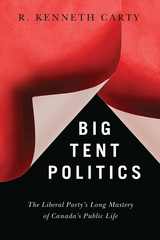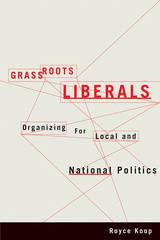Our shopping cart is currently down. To place an order, please contact our distributor, UTP Distribution, directly at utpbooks@utpress.utoronto.ca.

Renegotiating the Bargain
The Formation of Power-Sharing Arrangements within Canadian Political Parties
The franchise bargain that once divided Canadian political parties into separate spheres of authority – with members on the ground and elites at the centre – has been displaced. Renegotiating the Bargain explains why parties have reformed their internal decision-making structures, and shows how the new arrangement operates.
Rob Currie-Wood draws on in-depth interviews with current and former party officials, party governance documents, and election financing reports to trace organizational change within the Liberal, Conservative, and New Democratic parties since the end of the twentieth century. Systemic forces have reshaped democratic norms, communication technology, and party finance laws, pressuring parties to modify the distribution of decision-making power. Rank-and-file members now possess the same participatory rights as long-time activists and elected officials. Although this helps to make parties more inclusive of individual members, the central party apparatus in Ottawa now also has capacity to regulate and monitor membership participation in policy-making, leadership selection, candidate nominations, and election campaigning.
Despite this major shift in decision-making, Renegotiating the Bargain demonstrates that parties remain meaningful sites of civic participation in Canada’s democratic life. Its findings reveal not only the evolution of power-sharing arrangements within parties but also how party democracy works in practice.
Scholars and students of Canadian politics generally, and political parties and elections specifically, will find this thorough study deeply interesting. It will also engage international scholars working on organizational change within political parties, and practitioners and journalists covering Canadian and provincial politics.
A lot of this internal party organization happens behind closed doors, and it is murky and hard to study. Renegotiating the Bargain offers a significant and original addition to the existing literature on Canadian political parties, and a much-needed update for the twenty-first century to Carty’s stratarchical model of Canadian political party organization.
Through a nuanced analysis and multi-method approach, Renegotiating the Bargain moves beyond the franchise model, challenging traditional thinking on how the ‘faces’ of parties interact and share power. It brings new insights to the Canadian and comparative parties literature.
Rob Currie-Wood is the Grant Notley Memorial Postdoctoral Fellow at the University of Alberta and a recipient of the Canadian Political Science Association’s Vincent Lemieux Prize. He is co-author, with William P. Cross and Scott Pruysers, of The Political Party in Canada and has published in leading journals such as Political Geography, Party Politics, and the Canadian Journal of Political Science.










